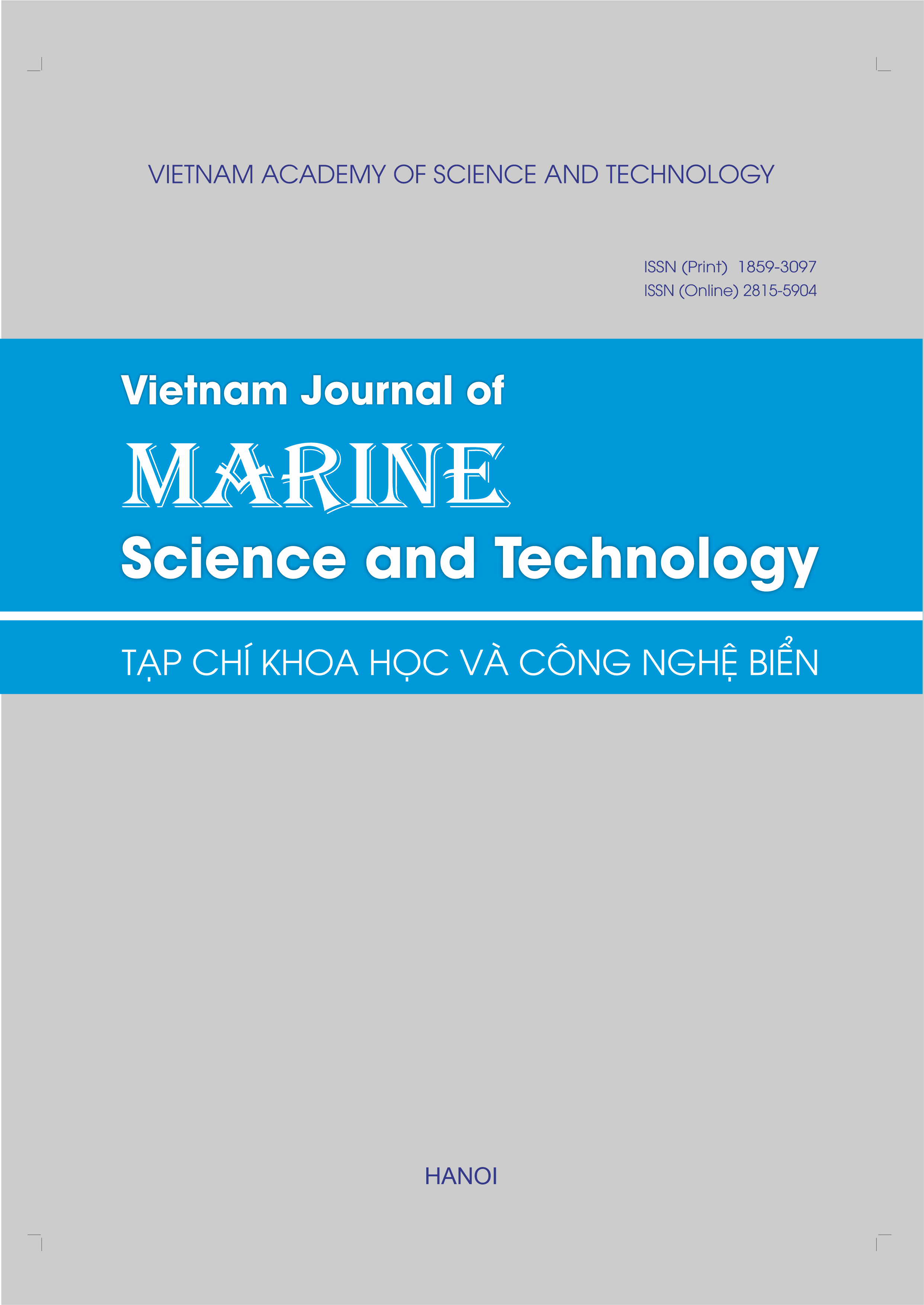THE CHARACTERISTICS OF PRE-CENOZOIC BASEMENT STRUCTURES OF THE TRUONG SA ARCHIPELAGO AND ADJACENT AREAS
Author affiliations
DOI:
https://doi.org/10.15625/1859-3097/17/2/10161Keywords:
Truong Sa archipelago, structure, pre-Cenozoic basement, 3D gravity model.Abstract
Truong Sa archipelago is located in the South of East Vietnam Sea, thus impacted by the strong tectonic activity in the Cenozoic. Pre-Cenozoic basement is strongly differentiated and has complex structures. For interpretation of tectonic evolution in the Cenozoic, the up-down blocks, basement depth and fault systems of the basement must be determined. 3D gravity anomaly model is a new approach to solve the structural problem above. In this paper, the gravity gradient tensor method is applied to determine the basement depth; the low-frequency filter method and the maximum horizontal gradient method are used to determine the fault systems of the basement. Based on basement depth and fault systems, the basement is divided into the structural units. The study results show that the basement depth difference between model and well data is approximately 3%. Basement structures are differentiated and complicated, the basement depth is changed from a few km near shore to over 10 km in Tu Chinh - Vung May Basin; the major direction of fault system is Northeast - Southwest.Downloads
References
Briais, A., Patriat, P., and Tapponnier, P., 1993. Updated interpretation of magnetic anomalies and seafloor spreading stages in the South China Sea (Bien Dong Sea): Implications for the Tertiary tectonics of Southeast Asia. Journal of Geophysical Research: Solid Earth, 98(B4), 6299-6328.
Hutchison, C. S., and Vijayan, V. R., 2010. What are the Spratly islands? Journal of Asian Earth Sciences, 39(5), 371-385.
Tapponnier, P., Peltzer, G., Le Dain, A. Y., Armijo, R., and Cobbold, P., 1982. Propagating extrusion tectonics in Asia: New insights from simple experiments with plasticine. Geology, 10(12), 611-616.
Taylor, B., and Hayes, D. E., 1980. The tectonic evolution of the South China Basin. The tectonic and geologic evolution of Southeast Asian seas and islands, 89-104.
Taylor, B., and Hayes, D. E., 1983. Origin and history of the South China Sea (Bien Dong Sea) basin. The Tectonic and Geologic Evolution of Southeast Asian Seas and Islands: Part 2, 23-56.
Nguyễn Trọng Tín và nnk., 2010. Báo cáo đề tài Nghiên cứu cấu trúc địa chất và đánh giá tiềm năng dấu khí khu vực Trường Sa (bao gồm cả Tư Chính - Vũng Mây). Đề tài cấp Nhà nước KC.09.25/06-10.
Sandwell, D. T., and Smith, W. H., 2009. Global marine gravity from retracked Geosat and ERS-1 altimetry: Ridge segmentation versus spreading rate. Journal of Geophysical Research: Solid Earth, 114(B1).
Sandwell, D., Garcia, E., Soofi, K., Wessel, P., Chandler, M., and Smith, W. H., 2013. Toward 1-mGal accuracy in global marine gravity from CryoSat-2, Envisat, and Jason-1. The Leading Edge, 32(8), 892-899.
Smith, W. H., and Sandwell, D. T., 1997. Global sea floor topography from satellite altimetry and ship depth soundings. Science, 277(5334), 1956-1962.
Nguyễn Như Trung, Nguyễn Thị Thu Hương, 2004. Cấu trúc mặt Moho khu vực biển Đông theo bài toán ngược trọng lực 3D: Luận giải trạng thái cân bằng đẳng tĩnh vỏ. Tạp chí địa chất, 285.
Bùi Công Quế, Trần Tuấn Dũng và nnk., 2005. Báo cáo đề tài Xây dựng tập bản đồ những đặc trưng cơ bản về điều kiện tự nhiên và môi truờng vùng biển Việt Nam và kế cận. Đề tài cấp Nhà nuớc KT-09-02.
Braitenberg, C., Wienecke, S., and Wang, Y., 2006. Basement structures from satellite-derived gravity field: South China Sea (Bien Dong Sea) ridge. Journal of Geophysical Research: Solid Earth, 111(B5).
Trần Tuấn Dũng, Nguyễn Thị Hải Hà, Nguyễn Quang Minh, Bùi Thị Nhung, 2014. Một số kết quả ứng dụng của đo cao vệ tinh trong nghiên cứu cấu trúc địa chất Biển Đông Việt Nam. Tạp chí địa chất, Loạt A, 341-345, 309-316.
Hutchison, C. S., 2004. Marginal basin evolution: the southern South China Sea (Bien Dong Sea). Marine and Petroleum Geology, 21(9), 1129-1148.
Yan, P., Wang, Y., and Liu, H., 2008. Post-spreading transpressive faults in the South China Sea (Bien Dong Sea) Basin. Tectonophysics, 450(1), 70-78.
Jorgensen, G. J., Kisabeth, J. L., and Routh, P., 2001. The role of potential field data and joint inverse modeling in the exploration of the deepwater Gulf of Mexico mini-basin province. Petroleum Frontiers, 17, 18-35.
Tran Tuan Dung, Bui Cong Que, Nguyen Hong Phuong, 2013. Cenozoic basement structure of the South China Sea (Bien Dong Sea) and adjacent areas by modeling and interpreting gravity data. Russian Journal of Pacific Geology, 7(4), 227-236.
Hao, T. Y., Xu, Y., Sun, F. L., You, Q. Y., Lü, C. C., Huang, S., Qiu, X. L., Hu, W. J., and Zhao, M. H., 2011. Integrated geophysical research on the tectonic attribute of conjugate continental margins of South China Sea (Bien Dong Sea). Chinese Journal of Geophysics, 54(6), 988-1008.
Huchon, P., Nguyen, T. N. H., and Chamot-Rooke, N., 2001. Propagation of continental break-up in the southwestern South China Sea (Bien Dong Sea). Geological Society, London, Special Publications, 187(1), 31-50.
Franke, D., Savva, D., Pubellier, M., Steuer, S., Mouly, B., Auxietre, J. L., Meresse, F., and Chamot-Rooke, N., 2014. The final rifting evolution in the South China Sea (Bien Dong Sea). Marine and Petroleum Geology, 58, 704-720.
Hinz, K., Kempter, E. H. K., and Schlüter, H. U., 1985. The Southern Palawan-Balabac area: an accreted or non-accreted terrane. In Proc. 3rd Asian Council on Petrol.(ASCOPE), Conf. Exhib., 1985, Kuala Lumpur, Malaysia (Vol. 2, pp. 48-60).
Hinz, K., and Schlüter, H. U., 1985. Geology of the dangerous grounds, South China Sea (Bien Dong Sea), and the continental margin off southwest Palawan: results of SONNE cruises SO-23 and SO-27. Energy, 10(3-4), 297-315.
Schlüter, H. U., Hinz, K., and Block, M., 1996. Tectono-stratigraphic terranes and detachment faulting of the South China Sea (Bien Dong Sea) and Sulu Sea. Marine Geology, 130(1-2), 3958-5178.
Hoàng Văn Vượng và nnk., 2014. Nghiên cứu đặc điểm cấu trúc và mật độ trung bình đất đá trầm tích khu vực trũng sâu Biển Đông-quần đảo Trường Sa và kế cận theo tài liệu địa vật lý. Tạp chí Các khoa học về Trái đất, 36(3CĐ), 321-328.








